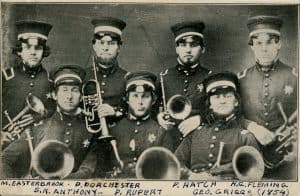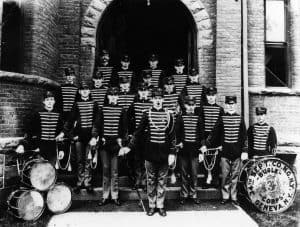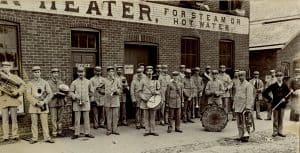Home Music: 19th Century Bands in Geneva
By Alice Askins, Education Coordinator at Rose Hill Mansion
Before modern technology, we made our own music. In the later 19th century, most American towns had bands, usually brass bands, and the Geneva newspapers often mentioned local bands. The Gazette seems to have covered music most closely, possibly because its editor S. H. Parker played in a band in his younger days. Between 1850 and 1899, the papers referred to bands from Auburn, Binghamton, Canandaigua, Corning, Gorham, Ithaca, Lodi, Lyons, Magee’s Corners, Manchester, Newark, North Hector, Oswego, Ovid Center, Palmyra, Penn Yan, Rochester, Savannah, Seneca Castle, Seneca Falls, Shortsville, Syracuse, Walworth, Waterloo, Watkins Glen, and Willard. Larger cities often had more than one band. Though the civic bands played for military events, militia or reserve units often had their own groups. Corning and Ithaca, at least, had bands made up of African Americans. Fire companies sometimes had bands. By the end of the century, employees of Herendeen Manufacturing had formed a band.

Music was wanted for many occasions. One or more bands accompanied most theatrical and circus performances. The papers also mention brass bands being part of Emancipation Day observances, store sales, steamboat excursions, picnics, steam boat launches, school exhibitions and commencements, charity benefits, military maneuvers and encampments, political rallies, funerals, bicycle races, Washington’s birthday, and the Fourth of July. Sometimes the local band delivered concerts or played through the streets of Geneva. Enthusiasm for music ran deep. The Advertiser reported about a Fireman’s Day in September 1889:
. . . seven brass bands filled the air with their music and this being not quite enough, the tin shops were visited, their stocks of tin horns investigated, and more bands were formed, their time [rhythm] being somewhat better than the harmony.” We probably still enjoyed it – as the Courier said in April of 1859, “We are home patrons, and regret to see imported music, however superior.
The newspapers less often mentioned what kinds of music these bands played. In the 1880s, however, they gave us some clues. In April 1883, the Advertiser mentioned Sutton’s band playing pieces “arranged from the leading operas of the day.” (A few productions of the early 1880s included Gilbert & Sullivan’s Patience and Iolanthe, Verdi’s Simon Boccanegra, Offenbach’s Tales of Hoffman, and Wagner’s Parsifal.) In 1884, the Gazette mentioned bands playing waltzes, marches, and “Home Sweet Home.” Soloists with the Geneva band sang “Miserere,” “Tears, Idle Tears,” (a Tennyson poem set to music) and “Maid of Dundee.” In June 1884, the band played “Auld Lang Syne.” It also played “Marching through Georgia” for a Civil War veterans’ event. By the 1890s, Sousa marches were popular. For patriotic occasions, the bands probably delivered “Hail, Columbia” (our unofficial national anthem for much of the 19th Century). “My Country ‘Tis of Thee” and “America the Beautiful” were also popular. The “Star-Spangled Banner” was known, but did not become our national anthem until 1931.
Apparently, Geneva had trouble keeping its band (or bands) going. In April 1851, the Gazette reported that Boswell’s Brass Band would be performing:
The band have been industriously engaged for some time past, in acquiring proficiency for the occasion.…” Afterwards, the paper assured us that the concert “went off in fine style…the services of Mr. BOSWELL and his amateurs are rightly appreciated…their efforts to perfect and make permanent a Brass Band in Geneva [should] be sustained by its citizens…” Some help must have been forthcoming, since in June the band had a “beautiful and new uniform.
Only two years later, though, the band had lapsed. In May 1853, the Gazette reported:
We are pleased to learn that measures are in progress to revive the “Geneva Brass Band.” Nearly all the old members are still residing here, it is hoped permanently. In the re-organization, it is designed to instruct one of them in the use of a leading instrument; so that…the permanency of the Band will not be hazarded, as heretofore, by the leader’s being a mere transient resident.…
Again, hopes were dashed. The Daily Gazette discussed the issue in March 1856:
“OUR VILLAGE BAND. … This association has heretofore been partially composed of a class of young men, who have had but a temporary residence among us, and consequently vacancies have constantly occurred…which it has been very difficult to fill with permanent and competent members. It is now proposed to select from the musical talent of our village, (which is by no means inferior,) a sufficient number of permanent residents to make up the complement for a full organization. … All that remains is, for our citizens to manifest a little generosity in the matter [so the band could buy instruments and uniforms.]…
Not having a band frustrated some Genevans. The Gazette, March 1856:
Upon public days, we are now under the necessity of sending abroad for this seemingly necessary accompaniment to our many…gala occasions. We are almost entirely precluded from engaging in the reception of those organizations which are wont to visit our sister villages, and which are so beneficial in promoting a spirit of kindly feeling…. [Bands visited other bands, just as fire companies visited other fire companies.] We are a deal behind our neighbors in this respect…we have in a great degree lost, that good name which should justly belong to us. …we do hope that our citizens will…generously aid in the furtherance of a cause of such public interest and entertainment.

34th Separate Co. Band.
The Geneva band went through frequent fluctuations in personnel, leadership, and activity through the rest of the century. In September 1866, the Courier complained, “We see by the Waterloo Observer that that village has just organized a Brass Band . . . Why is it that Geneva is without one?” By the following May, the Gazette referred to Sutton’s Band, and in October 1868 the paper remarked that the group had improved greatly.
In May 1869, though, the Gazette had bad news:
We regret to learn that a “rumpus” has broken out in and broken up the late Brass Band organization of our village. Of the nature of the difficulties we are not advised. The instruments were purchased by subscriptions raised among our citizens. Col. Prince as trustee for the subsc[r]ibers, is entitled to the instruments, holding the written promise of each member of the Band to return the same on withdrawing from the organization.
Two factions are now at work endeavoring to get up organizations and lay claim to the use of these instruments. Which will come out ahead remains to be seen.
The Gazette mentioned an excursion in September to Watkins Glen accompanied by Cole’s Brass Band of Geneva. Mr. Cole, though, may not always have been around. In May 1871, the paper stated, “Prof. James Cole, late an attachee of Alexander Robison’s Circus, as musician, has returned to Geneva, the tenting season of 1871 being over. He will proceed to reorganize the brass band.”
By August 1875 a second brass band had been organized (perhaps by the second faction attempting to acquire the instruments in 1869). The Gazette reported that a set of instruments had been purchased for the “younger band,” and that money had been raised by subscription. The subscription document stated:
The undersigned feeling the necessity of a stronger culture of music in Geneva…cheerfully subscribe the sums opposite our names, and feel inclined to double the amount…were we not fearful that others would deem themselves slighted should sufficient funds be realized before all have a like opportunity to contribute.
[This is a brilliant rationale for not giving much money.] The amount herein thus realized is to be devoted to the purchase of a set of brass instruments for the organization known as THE GENEVA BRASS BAND.
The following April the Gazette reported that the Geneva band had been recently reorganized under D. G. Sutton. The paper did not explain whether this was the younger or the older band. By October, the group was “the most promising musical organization ever had in Geneva.” Sutton’s Brass and Quadrille Band was still highly popular in 1880.
By 1885, though, Geneva once again had two brass bands. The Advertiser observed in April that Decoration Day would bring out both bands – “Sutton’s new band,” and “the old band as newly organized with Fred L. Smith, Leader….” There must have been some confusion between the groups, and in June, the Advertiser clarified:
G. Sutton’s advertisement in the Courier would lead people to suppose that he still has charge of the band [formerly] known as “Sutton’s Brass Band,” whereas his connection with the band was severed last fall. The band now known as the GENEVA BRASS BAND is the original Sutton’s Brass Band, and has all the old members except Mr. Sutton himself, and one or two [who] have removed from Geneva. Of this superior organization Wm. H. Alleman is business manager….
The superior organization must not have done well, though, without its former conductor. In October, the Gazette announced that:
THE old Geneva Band which furnished such good music . . . for many years, disbanded on Monday evening last. It is expected that several of the members will join Sutton’s brass band . . . Mr. Sutton is acknowledged to be one of the best band instructors and leaders in Western New York, and he has brought the members of his new band to a state of perfection that was hardly expected.

The Citizens Cornet Band
Sutton’s band appears in the papers into the 1890s, but by then the papers also refer to the Geneva orchestra, conducted by L. L. Mead. Toward the end of the century Genevans had more musical options. Nationally known bands played here, including F. N. Innes’s Famous New York Band (at Smith Opera House in 1894), Patrick S. Gilmore in 1891 and John Philip Sousa, at the Smith in December of 1892. Geneva’s papers also give us hints of a coming revolution. The Advertiser reported on September 24, 1889:
Storing Music. Pittsburg Dispatch.
In a hall attached to Mr. Edison’s laboratory at Llewellyn Park, Orange, N. J., you might hear…one of the crack bands of New York playing the latest popular airs…. In place of a living, breathing audience there are ranged about the hall a number of phonographs whirling away under the influence of an electric engine…each phonograph inscribes on its waxy cylinder every note it hears…. Any one who owns a phonograph can buy one or a hundred of these pocket brass bands. It becomes easy to give a full brass-band concert in the smallest drawing-room imaginable without the least inconvenience…dozens of well-known Pittsburgers are indulging in band concerts at home.
